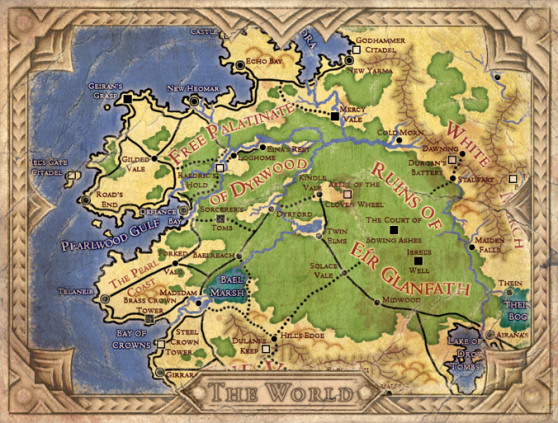Nearly two weeks into funding, Project Eternity has already fostered one of the fastest-growing role-playing game worlds out there — with more than 47,000 people looking to move in.
[aditude-amp id="flyingcarpet" targeting='{"env":"staging","page_type":"article","post_id":531431,"post_type":"story","post_chan":"none","tags":null,"ai":false,"category":"none","all_categories":"games,","session":"A"}']As some RPG players know by now, Obsidian Entertainment (makers of Fallout: New Vegas and the upcoming South Park: Stick of Truth) unveiled the independent project on Kickstarter on Friday, Sept. 14. It asked regular gamers for help and has raised over $2 million since. That extra money for stretch goals has enabled the developers to add more color and depth to the budding RPG — such as a novella set in the game world and an expanded character creation system with different classes, races, and companions.
“The incredible opportunity that Kickstarter and our fans are giving us is the capability to build a whole new RPG brand,” Feargus Urquhart, the chief executive officer of Obsidian, told GamesBeat. “It’s one that we control, one that we can continue to invest in, and one that we can direct according to our conversation with the people we are making it for. At Obsidian, we really hope that this won’t be the first Project Eternity game or even the only use of the new world that we have been creating. We have already heard from people interested in seeing novels, board games, card games, and future games within the universe. The fact that we can explore all of those opportunities ourselves is really refreshing.”
The magic and adventure all traces back to one place: the company’s past. Obsidian emerged after Black Isle Studios closed in 2003, having published and developed games such as Baldur’s Gate, Icewind Dale, and Planescape: Torment — three big influences on Project Eternity. For Obsidian’s creative director Chris Avellone and game designers Tim Cain (creator of Fallout) and Josh Sawyer (Icewind Dale, Baldur’s Gate: Dark Alliance), who all worked for the now-defunct studio, Project Eternity is a return to their roots. But it’s also about moving forward.
“What Project Eternity opens up is another option for developers wanting to make RPGs to consider,” said Urquhart. “As an RPG maker, it doesn’t just need to be the choice between mobile or tablet and console anymore. There is a third option, and that is making a more traditional RPG for the Windows, Mac, and Linux market. We’ve always felt that the market was out there, and the response to the Kickstarter really proves that. The opportunity also allows us to look back at the RPGs we made in the past, consider the lessons that we have learned about RPGs over the last decade, and create something new that builds on those experiences.”
Players can create their own character and recruit others as they progress, engaging in “deep” dialogues and participating in tactical, real-time combat that you can pause (just as in the Infinity Engine games). Urquhart explained that developing the game for PCs, not consoles, is key to their vision.
“Consoles are a great platform for visceral combat, where you control a single character either through a first-person or third-person view,” he said. “Skyrim is awesome, and so are games like Batman: Arkham Asylum. What is harder on the console is to control a party of people in a more tactical way. Doing so means slowing the action down and providing a different view of the battle to ensure you are able to select where you want each person to go exactly. With a mouse and keyboard, you really get that control and combat becomes a very different experience.”
Working free of a publisher allows the developers “to own what we create and have more control over the product as a whole,” said Urquhart, and they had no problems reaching their goal. Donations cracked $1 million in the first 24 hours, rivaling Double Fine Productions’ record with its adventure game. They hit their requested $1.1 million in the afternoon on Saturday, Sept. 15. Now, nearly two weeks later, backers have contributed over $2 million total.
“Truthfully, we were expecting to be about halfway to our goal by the end of the first three or four days,” said Urquhart. “So to make our goal after less than a day-and-a-half was crazy! We are incredibly thankful to people for supporting us, and we take the responsibility very seriously. We want Project Eternity to be as awesome as our fans, and that’s the road we are taking: bringing back the incredible adventure, exploration, characters, and combat of the Infinity Engine games to those who have been missing it.”
[aditude-amp id="medium1" targeting='{"env":"staging","page_type":"article","post_id":531431,"post_type":"story","post_chan":"none","tags":null,"ai":false,"category":"none","all_categories":"games,","session":"A"}']
The campaign ends Tuesday, Oct. 16, which is plenty of time to receive even more support. Other big video game Kickstarters made comparable strides: Double Fine asked for $400,000 and raised $3.3 million for its adventure game, and Ouya set a goal of $950,000 and pulled in $8.6 million for further development of its Android-based console. Those are much lower asking numbers than what Obsidian has set for Project Eternity, but these and other projects have shown that the potential for video-game funding on Kickstarter is massive.
Considering Obsidian’s experience in the RPG market and the creative freedom they now have, fans can expect those benefits to pay off in an even bigger way.
